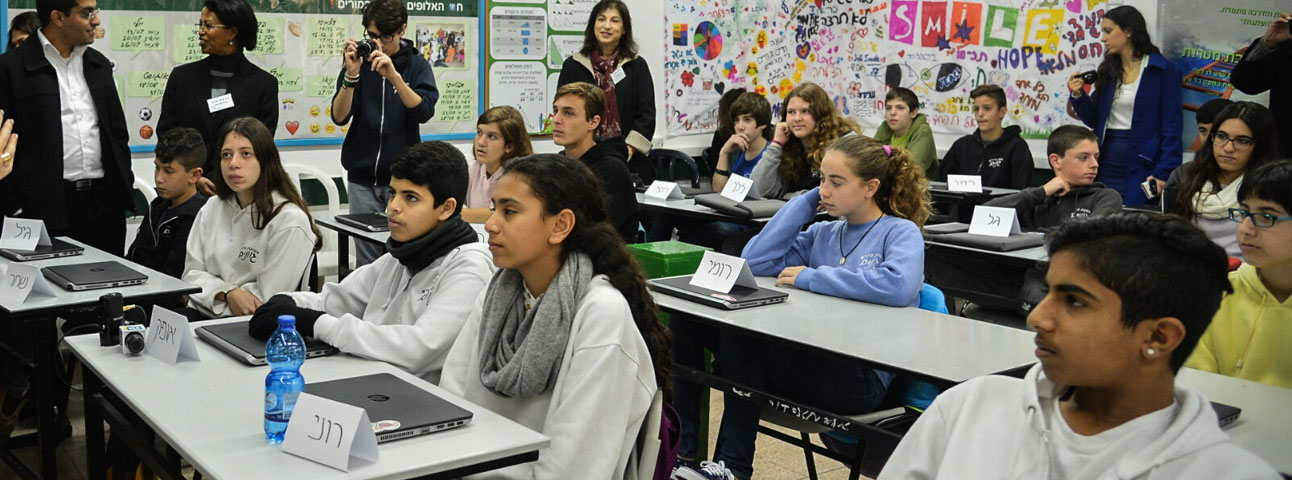Education. For Democracy. Now.
The education system must cultivate political and civic literacy of today’s pupils and tomorrow’s citizens

The education system must provide our next generation with the capacity and tools to understand the messages featured in the current political campaign as part of instilling in them a political and civic orientation. Otherwise, the political and public discourse will continue to be devoid of content.
With the election only a few weeks away, a new phenomenon has appeared in the political ads and slogans that adorn our intersections and overpasses: the use of three or four words, each followed by a period. These graphics are self-explanatory. Short words that seem to be precise and to the point. The punctuation assumes that everyone knows the meaning of these harsh words.
For example, “strong.” What does that mean? Who’s strong? A strong leader? Strong statements? What makes a leader strong? What promise is contained in the strength he or she offers, strengthened by a period? For example, “integrity,” “honest,” and “fairness” are meant to highlight the incorruptibility of the party and/or candidates—but in the complex situation of the past two years, these words have been reduced to euphemisms of Israeli politics. And what does “Genuine. Honest. Strong. Leadership” mean? It’s far from clear—and doesn’t seem to matter. What’s important is that it sounds clear and decisive—and especially with the punctuation.
The problem is that public discourse on issues that are existential for a divided and polarized society like ours today cannot be conducted by means of three or four short words and as many dots. It must take place in other spaces as well; for example-the Knesset, the media, and social media There, however, it is difficult and all but impossible to find one's way between the provocations, manipulations, fake news, and algorithms aimed at deciphering a person’s deep thoughts.
The most important space in which there is a real possibility of navigating through this maze in schools. Adolescents’ ability to interpret the meaning of the punctuated words must not rest only on their social network feed and their families. Alas, this crucial arena has been neglected for decades, and the pandemic— the economic and social crisis which it has created, along with too much distance learning-- has made this neglect very visible. , The fourth election campaign brings to light not only the depth of Israel's political crisis, but also-- the parties' confused messages, blurring of ideology, lack of a public discussion of major issues, and the surrender in advance of any explanation, justification, and grounds for statements and ideas, replaced by hollow slogans that may sound attractive but in fact are meaningless The new fad of using punctuation unnecessarily makes it even clearer that they say absolutely nothing. Period.
The change in this reality is linked to the way Israeli citizens understand and interpret the political situation in which they are immersed. The newly formed parties feel no need to go into detail and expand on the headline text, neither on billboards nor in online video clips. This situation will not change as long as the education system continues to betray its civic duty and ignores the explicit goals of the State Education Law 5713-1953, as amended in 2000, which include “to strengthen (students?) powers of judgment and critical faculties, to nurture intellectual curiosity, independent thought and initiative, and to develop awareness of and attentiveness to change and innovation.”
Our educational leadership must take a stand and declare that the cultivation of political and civic literacy of today’s pupils and tomorrow’s citizens is not something that can be left to electives and enrichment courses—and dealt with only after we finish dealing with all the other problems. In fact, it must be the at the very foundations of the education system in a democratic country. The system must deal with the way we talk about fundamental issues rather than stifle them; it must provide support to teachers and principals who understand this, and not stand in their way and, above all, it must recognize that if education for democracy is not integral to the core curriculum, it will be very difficult to change the current political culture. Perhaps we communicate this in the style of the current fad: Education. For Democracy. Now.
